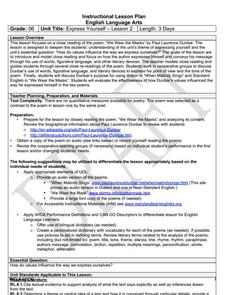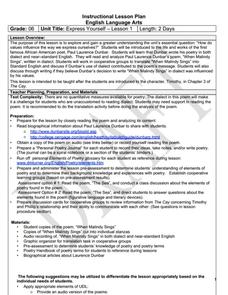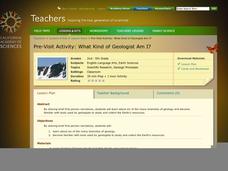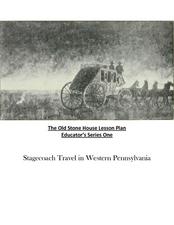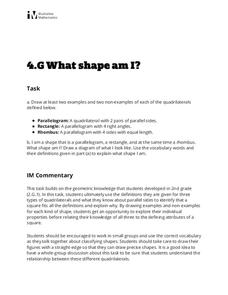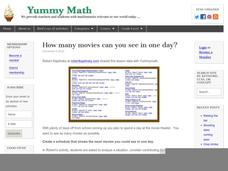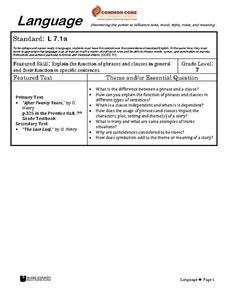Curated OER
Express Yourself Lesson Seed 12: Story Event
Focus on plot and the impact-specific events in The Cay. Class members use their double-entry journals, created in a previous lesson in this series, to record their thinking about the guiding question as they read chapters 15 through 17....
Curated OER
6th Grade: Express Yourself, Lesson 2: Close Read
The second instructional activity of a pair about Paul Laurence Dunbar, this plan focuses in particular on his poem, "We Wear the Masks." After a short historical introduction, class members conduct a series or readings, marking up the...
Curated OER
6th Grade: Express Yourself, Lesson 1: Poem
While originally created to accompany The Cay, this poetry lesson could be used on it's own, especially if you are working on dialect. Class members conduct a close reading of "When Malindy Sings" by Paul Laurence Dunbar and listen to an...
EngageNY
Getting to Know Esperanza (Chapter 2: "Las Uvas/Grapes")
Delve into Esperanza Rising by Pam Munoz Ryan with close reading and evidence-based, text-dependent questions. Part of a unit series, this well-sequenced, Common Core-designed activity draws on material from the previous day and homework...
Building Background Knowledge: Learning About the Historical and Geographical Setting of Esperanza Rising
Set up your class to read Esperanza Rising, by Pam Munoz Ryan, through a class read-aloud and exploration of the setting. The detailed lesson plan outlines each step. First, class members read over the first few pages and focus on the...
Smithsonian Institution
Art to Zoo: Life in the Promised Land: African-American Migrants in Northern Cities, 1916-1940
This is a fantastic resource designed for learners to envision what it was like for the three million African-Americans who migrated to urban industrial centers of the northern United States between 1910 and 1940. After reading a...
California Academy of Science
What Kind of Geologist Am I?
Transform your class into young geologists as they learn about six different branches of geology. Using the included geology career descriptions and picture cards, learners work in small groups deciding which tools and locations fit...
Curated OER
Not Getting the News about the Stamp Act
How did American colonists react to the Stamp Act of 1765? Your young historians will examine primary source material by reading excerpts from a transcription of the Pennsylvania Gazette and then identifying the sentiments expressed by...
Curated OER
Old Stone House Lesson Plan
From stagecoach to railroad tracks, your class will discover how advancements in travel in the United States during the nineteenth century played an integral role in the industrialization and development of American society. The main...
Westford Academy
Goals: Getting There
This is a general goal-setting activity that asks learners to set a specific goal, consider what roadblocks they might encounter, and then outline steps toward overcoming those roadblocks and ultimately achieving their goals. This can be...
Kenmore Town of Tonawanda UFSD
Fitness Lesson Worksheet
The best way to really learn something is to teach it! Using this worksheet as their guide, your class members will each create a 20-minute fitness lesson to teach to their peers. Lesson plan template calls for identification of the...
Illustrative Mathematics
What Shape Am I?
Sharpen your pencil and grab a ruler, it's time to draw some quadrilaterals! Given the definition of a parallelogram, rectangle, and rhombus, learners draw examples and nonexamples of each figure. The three definitions are then used to...
Friends of Fort McHenry
Cannons During the War of 1812
During the Battle of Baltimore in the War of 1812, only 25% of the bombs and rockets fired at Fort McHenry actually reached their target. Using an interactive online simulation, combine your historical study with physics and discover why...
Friends of Fort McHenry
Was the War of 1812 Our Second War of Independence?
Though it occurred almost 40 years later, could the United States have been fighting for their independence again in the War of 1812? Using appropriate primary source material from each of the two wars, compare and contrast the situation...
Friends of Fort McHenry
Privateers in the War of 1812: Soldiers or Thieves?
Do governments have the right to authorize individuals to perform illegal acts during times of war? Did the US government really employ pirates? Use the War of 1812 as your vessel to answering these questions through class discussion and...
Friends of Fort McHenry
Political Cartoons from the War of 1812
Long before the advent of Facebook and television, political cartoons were a primary mechanism for influencing public opinion. Support your learners through a thorough analysis process and explore how these cartoons had a profound effect...
ARKive
Adaptation: Design a Species
Adapt is what an animal does to ensure it will survive in a specific environment; maybe it's more complicated than that. Your young animal experts can view this handy presentation to better understand animal adaptations and also complete...
Google
Beginner & Intermediate 5: Evaluating Credibility of Sources
Convey how to determine appropriate and credible online sources with a series of three lessons. After completing the lessons, class members will know what kinds of sources to use, how to identify credible sources, and how tone and style...
Perkins School for the Blind
The Germinator
How does a plant grow from a seed? Observe the process with a clever idea from the PBS television show ZOOM. Watch the video, then have your young botanists create their own germinators. The instructional activity described here is for...
Curated OER
How many movies can you see in one day?
For kids who love movies, figuring out a schedule for the maximum number that can be seen in one day is not only a good demonstration of Common Core mathematical practices, but also a highly motivating activity. Robert Kaplinsky...
Curated OER
Leveled Vocabulary for And Then There Were None
Chaotic, perjury, tenacious, vague, predatory, idiosyncrasy. Using Marzano and Brown’s six steps of direct instruction for vocabulary (choose, restate, illustrate, use, discuss, play) readers of And Then There Were None engage in a...
Virginia Department of Education
Using Specific Vocabulary and Collaboration
Develop concepts on how to change your improving wordsmiths' writing from blah to wow with the activities and ideas in this resource. The instructor provides the class with examples of writing that lacks detail and precision, and then...
Virginia Department of Education
Creating Thesis Sentences
Growing writers explore what it takes to develop and support a thesis statement with pre-fabricated ideas provided by the Virginia Department of Education. Learners take notes on what makes a thesis statement and a topic sentence, and...
Wake County Public Schools
Language
Have your class doing everything from reading literature, analyzing literary devices, identifying independent and dependent clauses, discussing, and writing creatively with the rich resource found here. After a mini lesson on independent...



